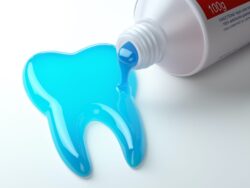 Bad breath can happen to anyone. In fact, studies show that 50 percent of adults have had bad breath, also known as halitosis, at some point in their lives — and these are just the people being honest with the researchers!
Bad breath can happen to anyone. In fact, studies show that 50 percent of adults have had bad breath, also known as halitosis, at some point in their lives — and these are just the people being honest with the researchers!
What Causes Bad Breath?
There are a number of reasons you might have bad breath. While most of the causes are harmless, some can indicate something more serious.
Bacteria
Our mouths are full of bacteria that naturally live in your mouth since it acts like a natural hothouse that allows them to flourish. When you eat, bacteria feed on the bits of food left behind in your mouth. This digestive process produces a foul-smelling waste product that causes bad breath.
Dry Mouth
It is possible your mouth may not be producing an adequate amount of saliva. Having enough saliva is important because it constantly washes halitosis-causing bacteria and food particles out of your mouth. If you don’t have enough saliva, your mouth and teeth aren’t being cleaned as thoroughly as they should be. Dry mouth can be triggered as a side effect of certain medications, untreated salivary gland issues or by breathing through your mouth. Keeping properly hydrated is necessary to prevent a dry mouth. Doctors recommend drinking at least 2 liters of water, or eight 8 ounce bottles per day to prevent dehydration.
Gum Disease
Persistent bad breath or a bad taste in your mouth that will not go away can be a warning sign of a case of advanced gum disease. Gum disease is when a sticky, cavity-causing substance called plaque builds up on your teeth near your gums, causing them to become infected and inflamed. Gum disease can cause not only halitosis but also places your teeth and jaw bone tissue at risk of decay.
Medical Conditions
While it makes sense that gum disease and other mouth infections can cause bad breath, other medical conditions can also be the culprit. If your dentist has ruled out other dental or oral health issues and you brush and floss every day, your halitosis could be the result of another problem, such as a sinus condition, gastric reflux, diabetes, liver or kidney disease. In this case, you must see your healthcare provider as soon as possible.
How Can I Prevent Bad Breath?
Brush and Floss
Brushing twice daily and cleaning between your teeth daily with floss will help rid you of bacteria in your mouth that’s causing your bad breath.
Take Care of Your Tongue
Don’t forget to clean your tongue when you’re brushing your teeth. If you stick out your tongue and look at the very back, you’ll see a white or brown coating. This is the location where most of the bad breath-causing bacteria live. Use your toothbrush or a tongue scraper to clean them off your tongue.
Mouthwash
Over-the-counter mouthwashes can eliminate some of the bacteria, neutralizing and temporarily masking bad breath. However, this solution is only temporary and the longer you wait between brushing and flossing, the more likely your breath will be offensive to others.
Keep Saliva In Your Mouth
Eat healthy foods that require a lot of chewing, such as carrots or apples and stay hydrated to maintain plenty of saliva in your mouth. You can chew sugar-free gum or suck on sugar-free candies. Your dentist may also recommend artificial saliva if these quick fixes do not help.
Schedule Regular Appointments With Your Dentist
If you’re in the Arlington Heights, IL area and you’re concerned about what might be causing your bad breath, schedule an appointment to see Dr. Brent Engelberg at AH Smiles. Regular check-ups will help Dr. Engelberg to spot any impending problems such as gum disease or dry mouth and stop them before they become more serious. If your mouth is healthy, you may be referred to your primary care doctor. To schedule a consultation with Dr. Engelberg at AH Smiles, call (847) 230-9703 or make an appointment online.
